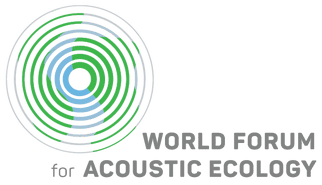|
Acoustic Ecology Review is an international journal and publishing platform for the World Forum for Acoustic Ecology and the international sound studies community. Acoustic Ecology Review (AER) is the evolution of Soundscape - the Journal of Acoustic Ecology, which has been the leading international journal for acoustic ecology research since 2001. Acoustic Ecology Review extends and enhances the work of Soundscape to publish accessible and inclusive research in various digital formats, including audio and video. AER is a place for listening, dialogue, and debate. This international peer-reviewed publishing platform is available to all WFAE members and scholars of the global acoustic ecology community. Acoustic Ecology Review is launching with the proceedings of 'Listening Pasts, Listening Futures', the 2023 World Forum for Acoustic Ecology Conference as the first edition. From March 23-26, 2023, the WFAE hosted its 30th anniversary with an international conference at the Atlantic Centre for the Arts in Florida, located near the Canaveral National Seashore, on the unceded lands of the Seminole people. The conference brought together a global cohort of over one hundred artists, academics, authors, students, and community engagement specialists in person and online to learn collectively from the past and imagine new futures based on a diversity of listening practices and acoustic relationships in our worlds. The conference proceedings have been co-edited by Milena Droumeva and Lindsey French, who have done a wonderful job curating this exciting body of research. As Milena and Lindsey have noted in their introduction to the proceedings, acoustic ecology has matured and moved in critical and prescient directions along with new diversities of voices in the field. These proceedings feature common themes around the ethics of field recording, feminist and queer methodology frameworks in thinking about place, pedagogical innovations, kinship, decolonisation, and radical art practices. It is an inspiring collection of articles and provides an excellent insight into the future direction of the journal.
I want to express particular thanks to Milena Droumeva, who is Glenfraser Endowed Professor in Sound Studies at Simon Fraser University, for facilitating a new partnership between the World Forum for Acoustic Ecology and Simon Fraser University to host the journal. The development of Acoustic Ecology Review on OJS (Open Journal Systems) was generously supported by the World Soundscape Project Educational initiative, led by Hildegard Westerkamp and Barry Truax. This support enabled WFAE Secretary Jesse Budel to assist in establishing the journal and launching the first edition and we are extremely grateful for his diligent work and support. Acoustic Ecology Review will enable more inclusive and accessible ways for the global acoustic ecology community to publish and share research. AER will be publishing editions of Soundscape: The Journal for Acoustic Ecology, conference proceedings of WFAE and those of WFAE Affiliate conferences, special editions, and independent articles. We will soon issue a call for an edition of audio papers, and we are very excited about working with a digital platform that enables us to publish in sound. The publication is conceived as a forum for communication and discussion about interdisciplinary research and practice in the field of Acoustic Ecology. It focuses on the interrelationships between sound, nature, and society. The journal seeks to balance its content among scholarly writings, research, and an active engagement in current soundscape issues, both in and beyond academia. As part of this evolution of the journal, we welcome new members to our editorial boards. We are currently calling for submissions for special editions, senior editors, and associate editors for 2024-2025. Associate editors can expect to review 3-4 submissions per year, and senior editors will also be engaged to review special edition proposals, mentor associate editors, and assist in the strategic direction of Acoustic Ecology Review by participating in quarterly meetings with the editorial team. We will also provide feedback and support for proposals for guest editions which in some instances will encourage guest editors to collaborate and combine their thematic proposals, fostering continued dialogue and collaboration among WFAE affiliates and offering opportunities for Early Career Researchers. Please do not hesitate to contact us with any questions, and we welcome your contributions and feedback in this exciting new phase for publishing and sharing the work and research of the global sound community through the World Forum for Acoustic Ecology. Please enjoy the first edition of Acoustic Ecology Review and have a wonderful festive season. Leah Barclay Soundscape Editor in Chief WFAE Vice President Comments are closed.
|
Archives
May 2024
Categories
All
|

 RSS Feed
RSS Feed